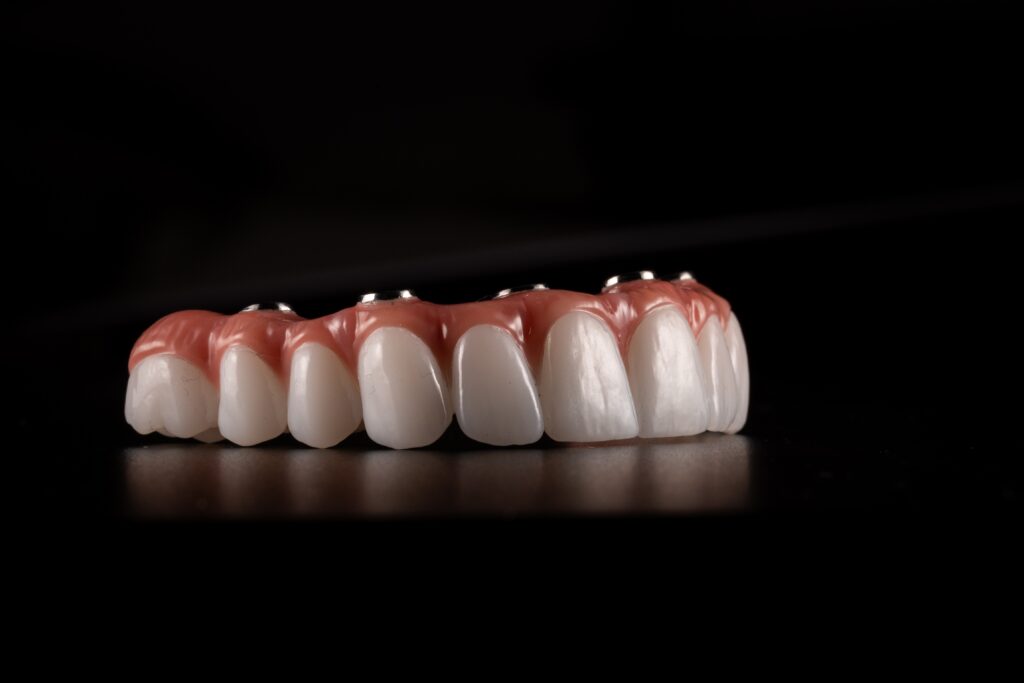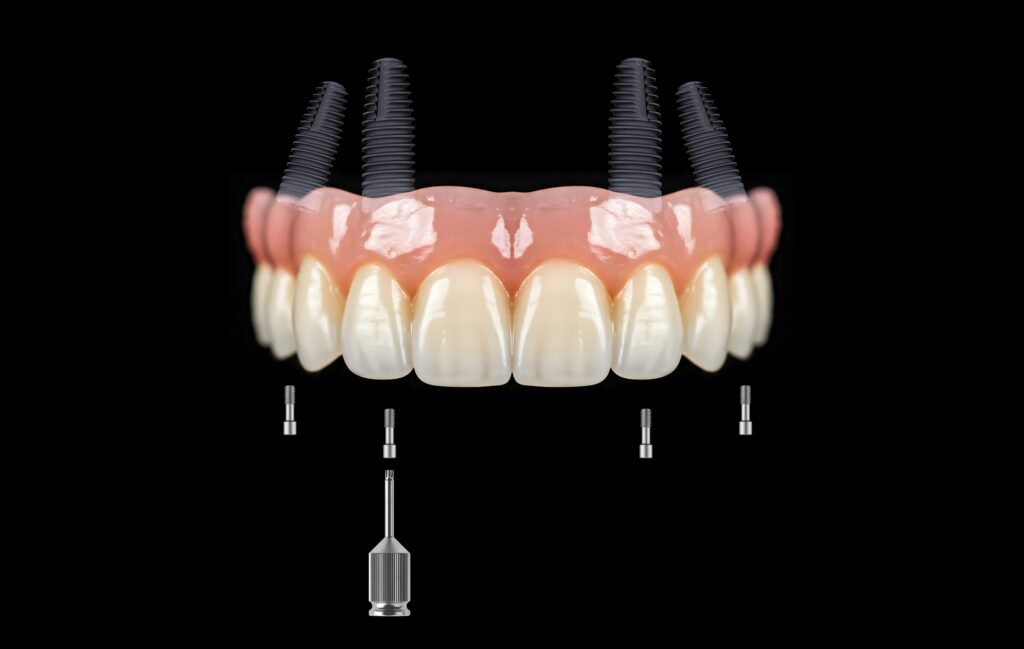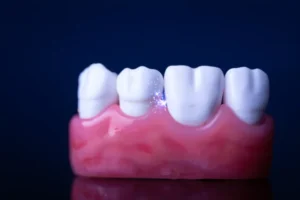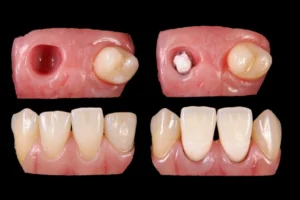Over the past two decades, zirconia has become well-established in the field of orthopedic joint replacement surgery for hip and knee prostheses due to its excellent mechanical properties and biocompatibility. However, when used in dentistry, it is essential to consider Zirconium Dental Implants Side Effects, including potential risks and complications, to ensure optimal patient outcomes.
Table of Contents
ToggleWhat are zirconia implants?
Zirconia is a biocompatible ceramic material widely used in modern dentistry. It has been applied in the fabrication of zirconia dental crowns, zirconia implant abutments, and zirconia implants. Since 2007, what are zirconia dental implants has been a common question, as these implants have gained popularity due to their excellent biocompatibility, durability, and ability to mimic the natural tooth color.
One of the benefits of zirconia dental implants is their superior aesthetics. Unlike titanium implants, which have a dark metallic hue, zirconia implants are white and blend seamlessly with natural teeth. They are particularly beneficial for patients with thin or recessed gingiva, as they provide a more natural appearance. Additionally, zirconia implants are metal-free, making them a preferred choice for individuals seeking Metal-Free Dentistry.
However, it is important to consider the disadvantages of zirconia dental implants. The available data is primarily based on case reports and small-scale studies, with limited long-term clinical research. Compared to titanium, zirconia implants have a lower fracture resistance and may be more prone to chipping. Some studies have suggested potential challenges with osseointegration, which could affect long-term success.
While short-term clinical studies have shown promising outcomes with no signs of implant mobility or peri-implantitis, many patients still ask, are zirconia implants safe? Current research supports their biocompatibility, stability, and long-term success, making them a strong alternative to traditional titanium implants. , comprehensive long-term evaluations are still needed. The disadvantages of zirconia dental implants must be carefully weighed against their benefits to determine their suitability for each patient.
Given that long-term clinical studies take years to complete, ongoing research remains essential in assessing the overall effectiveness of Zirconium Dental Implants. Understanding their durability and long-term success rates is crucial for both patients and dental professionals.
Additionally, factors such as Zirconium Dental Implants Cost play a significant role in treatment decisions, as prices can vary depending on the region, clinic expertise, and additional procedures required.
For patients seeking a full-mouth restoration with enhanced aesthetics, all on 4 dental implants zirconia It offers a durable and natural-looking solution, combining strength and biocompatibility for long-term dental health—especially when sourced from trusted zirconia implant manufacturers.
Choosing the Best Material for Dental Implants: A Guide for Patients
- Dental implants are a practical solution for reconstructing lost teeth.
- They serve as a titanium root that replaces the missing tooth’s root and supports a crown.
- Patients missing one or multiple teeth due to accidents, decay, or oral diseases may benefit from dental implants.
- Deciding to undergo a dental implant procedure is crucial, requiring an understanding of available alternatives, their benefits, and potential risks.
- Options for restoring lost teeth include fixed bridges or traditional dentures, which may lead to complications or dissatisfaction.
Fixed Bridges
- This treatment utilizes adjacent teeth as supports for an artificial tooth.
- A major drawback is that natural teeth must support the artificial tooth, which can lead to:
- Damage, irritation, or infection due to design issues or poor hygiene (Verma et al., 2023).
- Bacterial growth along the bonded section, potentially leading to bridge failure.
- Difficulty in cleaning artificial teeth and maintaining gum health.
- Gum recession, making the bridge’s edges visible over time (Balkrishna et al., 2022).
- Alveolar bone collapse, weakening the support of neighboring teeth.
Alternative Implant Options
- Zirconia hybrid implant denture offers a metal-free, durable alternative to traditional dentures, providing enhanced aesthetics and biocompatibility.
- Zirconia implants Turkey has gained popularity due to affordable treatment options and advanced technology in Turkish dental clinics.
Potential Risks and Considerations
- Patients should be aware of possible zirconium dental implants side effects, such as:
- A higher risk of fractures compared to titanium implants.
- Challenges with osseointegration, which may affect implant stability and success rates.
- Many ask, are ceramic dental implants safe? While they offer advantages like:
- Aesthetic appeal and biocompatibility, reducing gum irritation.
- Minimal plaque accumulation, improving oral hygiene.
- However, ceramic dental implants side effects should be considered, including:
- Brittleness, making them more prone to chipping under heavy bite pressure.
- Limited long-term studies, leaving uncertainties about their durability.
What is the Lifespan of Zirconia Implants?
Objective:
- The use of zirconia dental implants is gradually escalating due to their superior biocompatibility, aesthetics, and ability to overcome limitations of traditional implant materials.
- There is a documented paucity of long-term success and complication rates following zirconia implantation.
- Several short-term studies have shown promising results, but more comprehensive prospective studies are required to make a conclusive statement.
- The aim of this prospective clinical study is to examine the long-term success and complication rates of zirconia dental implants over five years (Kishor Shukla et al., 2024).
Methods:
- This clinical investigation will involve 102 partially or totally edentulous patients requiring single or multiple implant-supported prostheses.
- For each patient, one or more implants will be inserted in the posterior maxilla and mandates performed in the premolar or molar region.
- Data regarding factors such as reoccurrence, type of surgery, medical history, bite force, implant loading, number of attempts, and peri-implant bone level will be monitored.
Statistical Analysis:
- The cumulative means time of successful zirconia implants was computed by Kaplan-Meier survival examination with the log-rank test.
- The relationship between increasing success time and the above parameters will be assessed using the Cox proportional hazard model.
- Furthermore, the type and frequency of biological and technical complications will be logged.
Considerations & Comparisons:
- Zirconia implants side effects include potential fractures, lower flexibility, and osseointegration challenges.
- Zirconia implants disadvantages involve a higher risk of chipping compared to titanium and limited long-term clinical data.
- Zirconia dental implants price varies depending on clinic location and required procedures but tends to be higher than traditional titanium implants.
- Zirconia dental implants vs titanium remains a debated topic—while zirconia offers aesthetic advantages and metal-free composition, titanium is known for its durability and long-term success rates.
- Titanium implants side effects include possible allergic reactions, corrosion, and peri-implantitis, which zirconia implants may help mitigate.

Do Zirconia implants require Strict Maintenance and Aftercare?
The onset of the COVID pandemic saw a drastic change in our lifestyle. The most common ways of prevention were strict lockdowns and long-term quarantine. Quarantines have proven to be beneficial in preventing the rapid transmission of the virus, yet it alerted other health risks apart from SARS-CoV-2 infection. One of the most common adverse effects of lockdown situations seen in studies were psychological disturbances among various age groups of society.
Concerning these, various genres of scientific research were carried out in different countries to understand and analyze the impact of the lockdown situation of COVID-19, particularly on mental health. The lockdown was the effectual source to dodge the virus during COVID-19, yet individuals’ mental health was thereby altered due to confinement (Verma et al., 2023). A questionnaire-based study was conducted to evaluate the psychological side effects of quarantines on orthodontic and non-orthodontic patients during the COVID-19 period.
In all, a 10% reduction in the incidence of dental problems was reported during this period; still, cutthroat care is obligatory for patients’ oral health. Various studies conducted worldwide claim the affirmative psychological distress of the patients due to quarantine during the COVID times. To defeat these perturbations, suitable guidelines are provided to strengthen mental stability. Nepal is marching towards the same goal, concluding various studies.
Concerning construction, the strict lockdown imposed by the government of Nepal completely shut down all non-essential activities, triggering certain stressors like a lack of essentials, financial crisis, and so forth. Evidently, increased apprehensions, restlessness, anger, and other related attributes were also seen in various studies of Nepal during the lockdown period.
In the field of dentistry, studies also continue to analyze zirconium dental implants side effects, zirconium implants pros and cons, and the performance of zirconium oxide dental implants compared to traditional materials. The debate on titanium and zirconium implants remains active, particularly in discussions on dental implants zirconia vs titanium, evaluating their long-term success and patient outcomes.
How do zirconia implants compare to other materials, and do they have any zirconium dental implants side effects?
The COVID-19 lockdown had numerous impacts on individuals’ mental and physical health, affecting their overall well-being.
- This study aimed to explore how the lockdown affected parents’ mental health in India.
- A survey questionnaire was distributed among parents to assess the changing dynamics of their relationships with children and their mental health.
- The findings revealed an increase in children’s dependency on parents and a rise in physical fights and the use of harsh words.
- Parents also reported increased mental stress due to financial instability, relationships, and family health concerns.
Zirconia Implants and Their Effects
- Before formally diagnosing zirconium dental implants side effects, thorough investigations must be conducted since many common symptoms can be linked to multiple factors.
- However, are zirconia dental implants safe? Research suggests that zirconia is a bioinert biomaterial (Tchinda et al., 2023).
- Over the past decade, studies have indicated that zirconia is well-accepted in bone tissue, making it a reliable implant material.
Benefits and Comparisons
- The benefits of zirconia implants include:
- Superior biocompatibility, reducing allergic reactions.
- Aesthetic advantage due to its natural white color.
- The benefits of zirconia dental implants also extend to reduced plaque accumulation and a lower risk of gum irritation.
- However, the debate on zirconium implants vs titanium continues, as titanium implants offer:
- Higher durability and greater fracture resistance.
- Well-documented long-term success rates.
- A five-year study by Kishor Shukla et al. (2024) states that biologically, zirconia is an inert material that integrates well with bone, eliminating the need for additional grafting materials.
- The benefits of zirconia implants include:

What is the lifespan of zirconia implants, and can zirconium dental implants side effects impact their durability?
- Zirconia, recognized chemically as ZrO(2), and the cubic form yttria-stabilized zirconia has demonstrated favorable biocompatibility with bone and gingival tissue and has been applied in orthopedics since the late 1970s.
- More recently, zirconium dental implants have gained prominence as an alternative to titanium in the oral cavity.
- The aesthetic benefits, lack of corrosion, and similarity in elasticity modulus to bone prevent stress protection-associated bone loss seen with metal implants.
- Zirconium dental implant success has largely relied on its ceramic nature, ensuring no metallic core is exposed even when scratched, and providing a natural, translucent restoration.
Aesthetic and Mechanical Advantages
- Patients seeking a ceramic-like dental treatment often opt for zirconium dental implants.
- The implant design allows for submucosal positioning of the one-piece implant and angulated fixture placement using a specialized screwdriver.
- While aesthetic dentistry is not explicitly included in manufacturers’ recommendations, dentists increasingly prefer zirconium dental implants to avoid metal components in restorations.
Biocompatibility and Safety Considerations
- Beyond aesthetics, the biocompatibility of zirconia is well established—showing no DNA modification or adverse host response in animal studies.
- However, some zirconia dental implants problems have been noted, such as implant fractures due to its brittle nature.
- Studies indicate zirconium dental implants side effects may include osseointegration challenges compared to titanium.
- While many ask, are zirconia implants safe? research suggests species-specific variations in biocompatibility, warranting further clinical studies.
- Some zirconium implant problems arise from in-vitro studies revealing biocompatibility issues, though in-vivo research indicates no negative impact on cell viability.
Do zirconia implants require strict maintenance and aftercare to prevent zirconium dental implants side effects?
- The lockdown imposed to curb the spread of SARS-CoV-2 was enforced for an extended period, with only emergency services operational.
- This prolonged restriction, referred to as Black April, had a significant impact on education.
- Schools were closed, with some implementing virtual classroom systems, but online learning was insufficient.
- Many private teachers could not conduct online classes, and even prestigious universities had to halt academic activities.
- The mental health of students suffered, leading to increased cases of anxiety and depression.
- Parents, overwhelmed with stress, questioned why schools had remained closed for so long and whether education could be effectively delivered at home (Verma et al., 2023).
- As restrictions were lifted, schools reopened, and there was hope for a return to normalcy in education.
- However, ensuring strict public health standards remains crucial to preventing future disruptions.
Zirconia Implants and Their Maintenance
- The question remains, can tooth implants cause health problems? While rare, improper care can lead to complications such as peri-implantitis or implant failure.
- Full mouth zirconia implants are an advanced dental solution, offering aesthetic appeal and biocompatibility.
- Comparing Zirconia implants before and after images highlights their natural appearance and integration with surrounding tissues.
- Various Zirconia implant brands offer different designs and coatings to enhance osseointegration and improve implant longevity.
- Proper maintenance and aftercare are essential to prevent zirconium dental implants side effects, ensuring long-term success.
- In conclusion, while Zirconium Dental Implants are celebrated for their biocompatibility and aesthetic advantages, it’s important to be aware of potential side effects such as allergic reactions, fractures, or peri-implantitis. These risks are generally minimal, making them a compelling option for many patients. For those seeking added strength and aesthetics, metal zirconia offers a reliable and visually appealing alternative, especially in cases where durability is a priority. For those weighing the benefits of different implant materials, exploring options like titanium zirconia can provide clarity. Ultimately, consulting with a dental professional will help determine if zirconium implants are the right choice for achieving a durable and natural-looking smile, especially when considering options from reputable zirconia implant manufacturers.
What are the disadvantages of zirconia implants?
Cons of choosing zirconia dental implants One of the most significant drawbacks of choosing zirconia dental implants is low-temperature degradation as the product ages. This could potentially result in the material's mechanical properties becoming degraded, reducing the material's strength, density, and toughness.
Are zirconia implants safe?
Zirconia is biocompatible since it does not induce a pseudo-teratogenic effect. It has no cytotoxic effect on osteoblasts and no bone reaction. The material does not generate any inflammatory reactivity, thus making it ideal for implants. The soft tissues respond well around zirconia abutments.
What is the healthiest dental implant?
It is lightweight, strong, and biocompatible, making it the most popular choice for dental implants. Additionally, titanium has the ability to osseointegrate with bone tissue, which ensures the stability of the implant.
How long do zirconia dental implants last?
So, how long do zirconia implants last? The good news is that with the proper care, zirconia dental implants can last up to 15 to 25 years and, in some cases, even a lifetime. However, just like with any dental procedure, the lifespan of your implants relies on how well you maintain them.
Kishor Shukla, A., Priyadarshi, M., Kumari, N., Singh, S., Goswami, P., B. Srivastava, S., and S. Makkad, R. “Investigating the Long-Term Success and Complication Rates of Zirconia Dental Implants: A Prospective Clinical Study. 2024. ncbi.nlm.nih.gov
Verma, S., Raj Bhupali, N., Pal Singh, S., Kumar, V., and Kumar Verma, R. “Orthodontic emergencies and mental health of patients undergoing orthodontic treatment during COVID-19 pandemic: A questionnaire study. 2023. ncbi.nlm.nih.gov
Balkrishna, A., Singh, K., Oberoi, G., Singh, P., Raj, P., and Varshney, A. “Psychological Impacts of COVID-19 in Dental Patients are Moderated and Mediated by Hospital-Infection-Control-Policy and Satisfaction-with-Life: A Prospective Observational Dental-COVID Study.2022. ncbi.nlm.nih.gov
Tchinda, A., Lerebours, A., Kouitat-Njiwa, R., and Bravetti, P. “Zirconia Dental Implants: A Closer Look at Surface Condition and Intrinsic Composition by SEM-EDX. 2023. ncbi.nlm.nih.gov
Xiong, X., Wu, Y., Fang, X., Sun, W., Ding, Q., Yi, Y., Huang, Y., Gong, J., Liu, J., and Wang, J. “Mental distress in orthodontic patients during the coronavirus disease 2019 pandemic. 2020. ncbi.nlm.nih.gov


